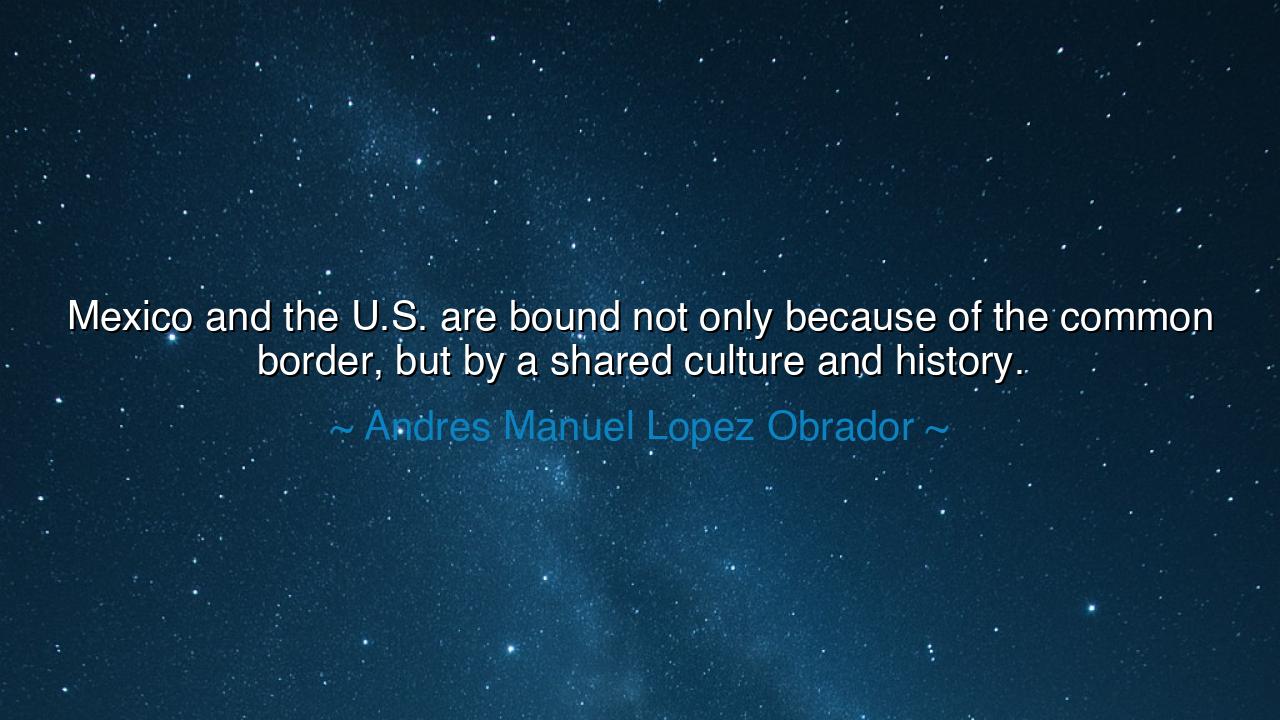
Mexico and the U.S. are bound not only because of the common
Mexico and the U.S. are bound not only because of the common border, but by a shared culture and history.






Andrés Manuel López Obrador, the voice of a nation rooted in both ancient soil and modern struggle, once declared: “Mexico and the U.S. are bound not only because of the common border, but by a shared culture and history.” In this statement lies not the language of diplomacy, but the wisdom of a man who understands that nations, like people, are woven together not merely by geography, but by the deep threads of destiny, memory, and shared humanity. His words echo across deserts and rivers, across generations and hearts — reminding both peoples that the line dividing them on a map cannot erase the bonds written in their pasts, nor the hopes they hold for their futures.
The meaning of this quote rests in the recognition that true connection between nations is not forged by treaties or trade alone, but by culture and history — by the shared experiences that shape their souls. Mexico and the United States, though distinct, have grown side by side for centuries, influencing each other’s food, language, music, art, and identity. The border between them is not a wall of separation, but a bridge of exchange — a place where two worlds meet, merge, and create something new. López Obrador’s words call upon both peoples to see beyond politics and division, and to acknowledge the deeper truth: that they are bound together by heritage, by struggle, and by the eternal rhythm of coexistence.
The origin of this wisdom is ancient, stretching back to the days before either nation bore its modern name. Long before the word Mexico was spoken or the United States was born, the lands were one continuous realm of life — of mountains and rivers, of pueblos and tribes, of migration and mingling. When the Spanish crown conquered Mexico, and when the young American republic expanded westward, these histories intertwined — not always in peace, but always in consequence. From this collision came a new people, a new culture — one neither wholly Mexican nor wholly American, but mestizo, border-born, and alive with dual spirit. López Obrador’s words remind us that this blending is not a curse of history but one of its greatest triumphs: the creation of unity from contrast, of harmony from struggle.
One might recall the story of El Paso and Ciudad Juárez, twin cities that stand across the Rio Grande — separated by a narrow ribbon of water, yet united by family, labor, and love. Generations have crossed back and forth — workers seeking opportunity, students chasing education, families reuniting after years apart. In these cities, the line on the map becomes almost invisible, for the culture flows freely, like the river itself. The smell of tortillas and barbecue mingles in the air; Spanish and English weave into a single tongue; mariachi and country music echo from neighboring houses. Here, López Obrador’s truth takes form: borders may define nations, but shared life defines people.
The spirit of connection he speaks of also lives in art and language. The songs of Carlos Santana, the stories of Sandra Cisneros, and the films of Guillermo del Toro all carry within them the heartbeat of both Mexico and the U.S. — the fusion of rhythm, color, and imagination that transcends nationality. Even in cuisine, the two cultures embrace: tacos sit beside hamburgers, and chilies find their way into southern kitchens. These are not trivial exchanges — they are the quiet revolutions of understanding, the proof that culture knows no border. Each generation inherits this shared identity, whether they live in Mexico City or Los Angeles, Monterrey or San Antonio.
Yet López Obrador’s message also carries a challenge: to recognize this shared destiny not merely as poetry, but as responsibility. For if culture and history bind two nations, then so too must compassion and respect. The lesson is that nations cannot live as neighbors while denying one another’s humanity. Walls may rise, but hearts must remain open. The rivers of heritage that flow between peoples cannot be dammed by politics; they must be channeled toward cooperation and peace. He urges both nations to look not backward in resentment, but forward in unity — to remember that the border, though drawn by men, lies upon a land made by God and shared by both.
The lesson, then, is simple yet profound: honor your connections, not your divisions. Whether between nations, families, or souls, remember that what binds us — memory, struggle, love, and art — is stronger than what divides us. Let every person who walks upon the earth see that the story of one people is never written in isolation, but always intertwined with the stories of others. For just as the desert cannot separate the wind, nor the river divide the sky, so too can no border undo what time and humanity have joined.
So, my children of the Americas, remember the words of Andrés Manuel López Obrador. The border is but a line in sand — it may mark where one land ends, but it cannot mark where one heart begins. The history of Mexico and the United States is not two stories, but one — the story of struggle and survival, of labor and love, of creation and renewal. Cherish this bond, nurture it, and let it remind you that to build bridges is the work of civilization, while to raise walls is the labor of fear. For only when we see our shared humanity will the land between earth and heaven truly know peace.






AAdministratorAdministrator
Welcome, honored guests. Please leave a comment, we will respond soon